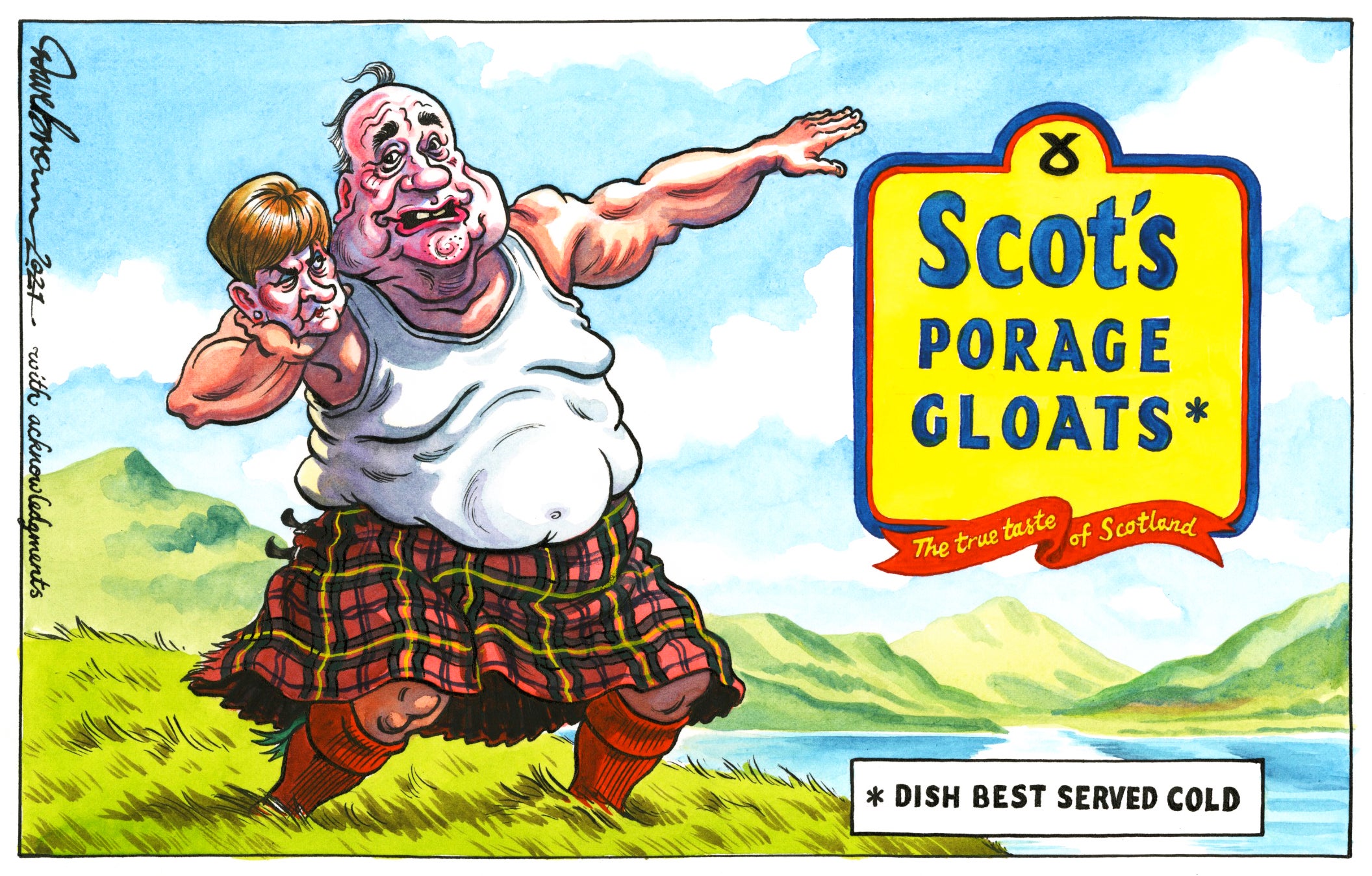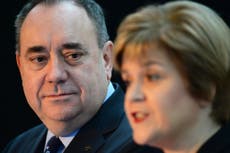Many Scots might now think twice about taking a leap to full independence
The psychodrama engulfing the SNP is remarkable for a party that prides itself on unity. Their cherished project is in danger, writes Andrew Grice


Normally, politics is like a see-saw: when one side is up, its opponent is down. Yet in the battle over whether Scotland should leave the UK, both sides are in disarray at the same time, and at a pivotal moment.
The psychodrama engulfing the Scottish National Party, with Nicola Sturgeon and Alex Salmond fighting like two scorpions in a bottle, is remarkable for a party that prides itself on unity and iron discipline and whose holy grail of independence is within touching distance.
Although the SNP is still on course to win a mandate for a second referendum in the May Scottish parliament elections, opinion polls are inevitably starting to turn, as the bitter feud between the party’s two biggest beasts and one-time allies dominates media coverage. More people now see the SNP as divided and one in five people who voted for the party in 2019 feels “less favourably” towards it. Three times as many SNP voters believe Sturgeon has generally told the truth than think her predecessor has.
Even SNP figures privately acknowledge the danger to their cherished project; it goes way beyond the maxim that divided parties lose votes. The affair has tarnished Scotland’s government, parliament and supposedly independent judicial system. If devolution has produced what SNP critics now call a “one-party state”, many Scots might think twice about taking a leap to full independence.
The bitter row reached new heights on Friday with Salmond’s explosive evidence to the parliament’s inquiry into the Scottish government’s handling of sexual assault allegations against him, for which he was cleared in court last year. He accused Sturgeon of using a coronavirus press conference to “effectively question the result of a jury”. Denying that Scotland is a “failed state,” he said: “Scotland hasn’t failed, its leadership has failed.” He claimed there had been a “calculated and deliberate suppression of key evidence” to the inquiry.
Sturgeon is due to respond next Wednesday to Salmond’s claims she misled the parliament and breached the ministerial code – which, if substantiated, could force her resignation. She has dismissed Salmond’s claim of a conspiracy against him as “wild” and “baseless”.
However, Boris Johnson cannot afford any schadenfreude because Downing Street has managed to write a psychodrama of its own. Amid another bout of infighting in No 10, three people have headed its union unit in the past three weeks.
Luke Graham, a former Tory MP, was replaced as the unit’s head by Oliver Lewis, a close ally of Dominic Cummings, the senior Johnson aide who departed last November. But then Lewis walked out in what some insiders described as a “hissy fit” and others as the final round of the fight between friends of Cummings and foes including Carrie Symonds, Johnson’s fiancée.
The person now in charge of Johnson’s drive to save the union is… Johnson, who will chair a new cabinet committee on the issue. After previously handing himself the title “minister of the union”, he could hardly let another minister take the reins. Yet Johnson is the wrong figurehead. His unpopularity in Scotland makes him the SNP’s best asset. He has already written the SNP campaign posters for the May elections by declaring devolution a “disaster”.
Other ministers on the new group will hopefully be influential. Rishi Sunak, the chancellor, would be a better frontman north of the border. Michael Gove, the Cabinet Office minister, favours love-bombing Scots rather than the aggressive approach proposed by Lewis.
Johnson will probably do both war and peace, attacking the SNP while loving the Scots and reminding them they have “two governments” by funding projects from London via Scottish local authorities. This is a tacit admission that the pro-union narrative needs to be more than just “SNP bashing”.
There’s a growing sense among UK ministers that “just saying no” to another referendum if the SNP wins a mandate would merely build support for independence. For the first time, ministers are starting to think there might have to be a second referendum. Their strategy would be to insist Scots voted on a detailed blueprint so they knew the full consequences rather than on the principle of independence.
Despite Salmond’s damaging allegations, the Tories cannot assume the SNP will fail to gain its mandate or that support for independence will drop below the 50 per cent mark. Nor should Johnson rely on Sturgeon resigning. Whatever the outcome in Edinburgh, Johnson’s partisan interpretation of the rules on ministerial standards might return to haunt him. The person giving Sturgeon cover to remain in office, even if she is judged to have breached the ministerial code, might be Priti Patel. Johnson allowed his home secretary to keep her job even though she broke the code over allegedly bullying staff.
That shameful episode has not been forgotten by the SNP. Despite the Salmond Show, on Scottish independence the see-saw could still tip in either direction.


Join our commenting forum
Join thought-provoking conversations, follow other Independent readers and see their replies
Comments